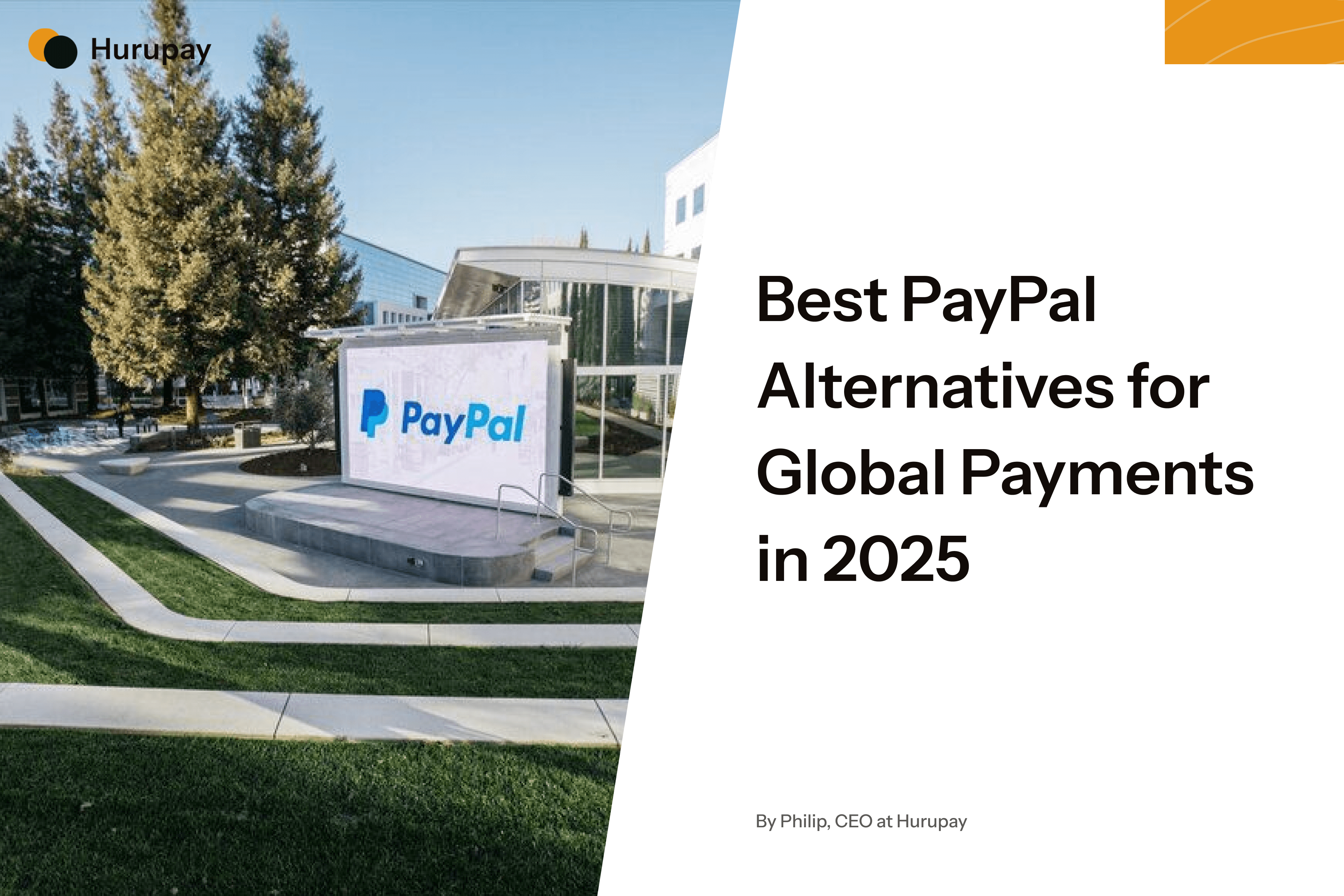Best PayPal Alternatives for Global Payments in 2025
Apr 20, 2025

PayPal has long been a go-to platform for sending and receiving money across borders. Whether you're a freelancer working with international clients, a remote worker getting paid by a U.S. company, or simply someone who needs to receive funds from friends or family abroad—PayPal is probably the first name that comes to mind.
But let's be honest.
From unexpected account freezes to high fees, limited support in emerging markets, and even blocked access in some countries, PayPal isn't always the best fit—especially if you're outside the U.S. or Europe.
So what are the alternatives? In this post, we’ll explore some of the top PayPal alternatives for international money transfers—and show you why Hurupay might just be the best option out there.
Best PayPal Alternatives for Global Payments in 2025
1. Payoneer
Payoneer is one of the oldest and most widely-used alternatives to PayPal, especially among freelancers and remote workers. It offers:
Virtual USD, EUR, and GBP receiving accounts
Integration with platforms like Upwork, Fiverr, and Amazon
Mastercard debit cards for withdrawals
Limitations:
While Payoneer supports global payments, fees can add up quickly. It also doesn’t offer much flexibility in how you hold or convert your funds—everything stays within the traditional banking rails. Additionally, does not support personal/individual customers. It is not designed for general personal use. It's primarily for businesses and freelancers receiving payments for business-related activities.
2. Grey Finance
Grey Finance is a newer player offering virtual international accounts (USD, EUR, GBP) via a mobile wallet interface. Users can receive payments, convert currencies, and withdraw to local bank accounts.
What makes Grey interesting:
Slick mobile interface
Multi-currency wallet support
Currency conversion options
Where it falls short:
Limited payout flexibility (no crypto options)
Slower withdrawal times in some regions
Not ideal for users looking for decentralized or stablecoin alternatives
3. Cleva Banking
Cleva targets Africans working abroad, allowing them to open USD accounts and get paid globally.
Perks include:
U.S. account numbers for receiving payments
Supports ACH and Wire transfers
Focused on remittances and remote work
Drawbacks:
Primarily serves Nigerians (limited regional coverage)
Tied heavily to traditional banking infrastructure
No blockchain or stablecoin integration
4. Hurupay – The Best of Both Worlds
Hurupay is quickly emerging as the top PayPal alternative—especially for people in emerging markets who want more control, speed, and freedom over their international payments.
What makes Hurupay stand out?
Receive USD like a local: You get a U.S. account and routing number in your name
Instant settlement in stablecoins: Incoming USD is instantly converted into USDC or USDT, giving you fast access to funds
Flexible withdrawals: Cash out as crypto or local currency via mobile money or bank account
Open to everyone: Whether you're in Kenya, Ghana, South Africa, or anywhere else—Hurupay is available and borderless
Blockchain-protected accounts: Your funds are secure, stable, and always accessible
Hurupay combines the accessibility of modern fintech with the efficiency of stablecoins—making it a more flexible, transparent, and global alternative to traditional payment platforms.
4. Skrill
Skrill has been around since 2001, and is one of the most established PayPal competitors. It is especially popular among gamers, traders, and digital entrepreneurs. You can open a Skrill account to make and receive digital payments and manage your money through the Skrill mobile app.
Skrill Limitations:
High transaction and currency conversion fees. International transfer exchange rate markup of up to 4.99% and also inactivity fee of 5 EUR or currency equivalent per month.
Limited availability of virtual bank accounts (especially in certain African and Asian countries)
Not widely accepted on major freelance platforms like Upwork or Fiverr
Complex account verification process for some regions
Frequently Asked Questions (FAQ)
1. Why should I consider alternatives to PayPal?
While PayPal is globally recognized, it comes with high fees, sudden account freezes, and limited access in many emerging markets. If you're outside the U.S. or Europe, you may face challenges using it reliably or efficiently.
2. What makes Hurupay better than PayPal?
Hurupay offers instant USD settlements via stablecoins (USDC/USDT), flexible cashout options (crypto or local bank/mobile money), and true global accessibility—no restrictions based on region or banking infrastructure.
3. Can I use Hurupay even if I’m not a business or freelancer?
Yes! Unlike platforms like Payoneer that cater only to businesses and freelancers, Hurupay is open to everyone—whether you're sending, receiving, or storing funds.
4. Is Hurupay safe to use?
Absolutely. Hurupay uses blockchain-protected accounts, meaning your funds are secured, stable, and always accessible. No risk of traditional bank shutdowns or PayPal-style freezes.
5. Which countries can use Hurupay?
Hurupay is borderless. Whether you're in Kenya, Ghana, Nigeria, South Africa, or anywhere else in the world, you can create an account and start receiving global payments in USD.
Final Thoughts
If you're tired of PayPal's limitations or simply want a smarter way to receive global payments, these alternatives are worth considering. Each has its strengths—but when it comes to speed, flexibility, and access in emerging markets, Hurupay leads the pack.
Whether you're a freelancer, remote worker, or global business—Hurupay is your gateway to seamless USD payments, powered by stablecoins. Hurupay combines the accessibility of modern fintech with the efficiency of stablecoins—making it a more flexible, transparent, and global alternative to traditional payment platforms.

